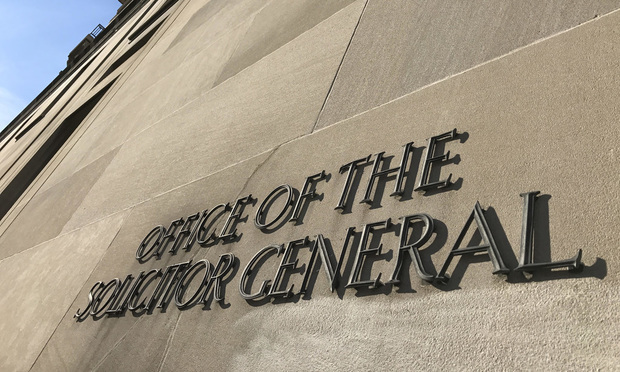Solicitor General's Social Security Switch
U.S. Solicitor General
Noel Francisco has changed Obama administration positions in three high-profile cases in the current Supreme Court term. On Thursday, the justices will take a first look at another switch in a
under-the-radar case whose outcome could be welcomed by certain group of practicing attorneys.
Francisco's office
is siding with
Richard Culbertson, an Orlando, Florida, attorney who represents Social Security claimants. Culbertson challenges how fees are awarded to attorneys under the Social Security Act for their work recovering past-due benefits before the agency and in federal district court.
The federal circuit courts are split on whether a 25 percent cap on fees for representation of claimants in court are only for in-court work or a cap on total fees earned for court and agency representations.
Culbertson is arguing against a cap on total fees. Three circuits—Sixth, Ninth and Tenth—hold the cap is only on fees for court representation. But the Fourth, Fifth and Eleventh circuits hold that the cap applies to total fees awarded for court and agency representations.
For Culbertson, the Eleventh Circuit
decision in his fee case meant the difference between a fee award of $4,488.48 for reversing the agency's initial decision in court, and an ultimate award of $1,623.48 under the overall cap of 25 percent for both his agency and court work.
The case, if it's granted review, would require the justices to work their way through the statutory language, structure and legislative history of two fee provisions in the act.
In addition to his statutory arguments, Culbertson’s lawyer, Daniel Ortiz of the University of Virginia School of Law’s Supreme Court Litigation Clinic, tells the justices in his petition that attorneys who represent claimants in these cases “do not do so to get rich.” And he offers some data from the Office of the Inspector General of the Social Security Administration to back up that statement.
Of the attorney and non-attorney representatives of claimants before the agency, 91 percent made less than $100,000 in annual income in the 2013 tax year. Their median annual income related to direct payments by the agency was only $7,800 in that tax year.
Francisco tells the court that the government has been “on both sides of the issue.” In 1994, the government argued against a 25 percent cap on total fees. But by 2007, it was defending an overall 25 percent cap and argued against Culbertson in the Eleventh Circuit.
“The government has now reconsidered its position in light of the certiorari petition,” Francisco tells the justices. “For that reason, if the court grants plenary review, the court may wish to consider appointing an amicus curiae to defend the judgment of the court of appeals.”
That was music to the ears of Ortiz and his client, no doubt.
“We’re very happy that the government has come round to our view of the case for the same reasons and hope that those same arguments ultimately prevail at the court,” Ortiz says.


Comments
Post a Comment